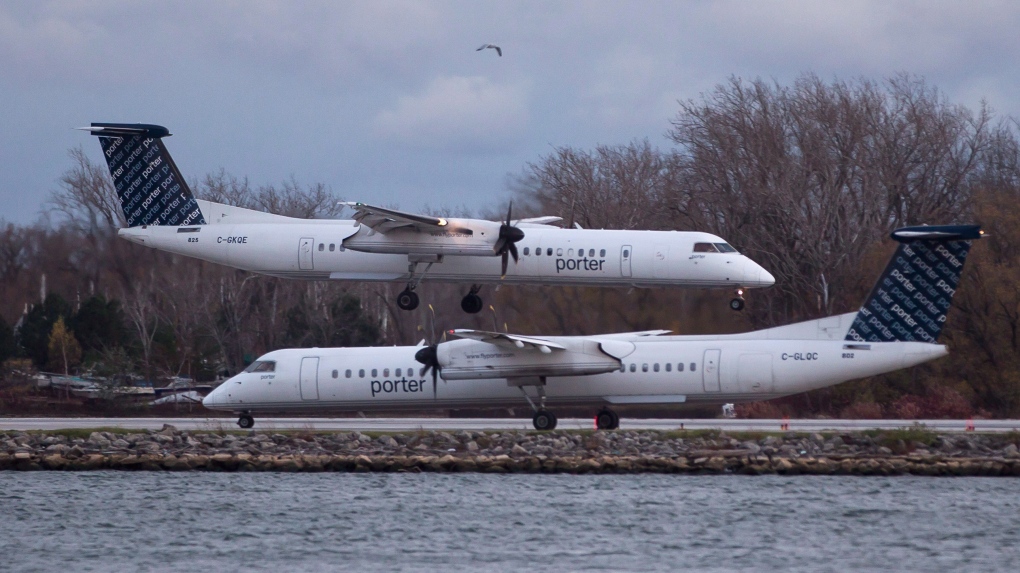
Porter Airlines to fly between Ottawa and Toronto Pearson airport
 A Porter Airlines plane lands next to a taxiing plane at Toronto's Island Airport on Friday, November 13, 2015. THE CANADIAN PRESS/Chris Young
A Porter Airlines plane lands next to a taxiing plane at Toronto's Island Airport on Friday, November 13, 2015. THE CANADIAN PRESS/Chris Young
Ottawa travellers flying to Toronto on Porter Airlines will soon have a choice of two destination airports.
Porter Airlines is adding new flights between Ottawa and Toronto’s Pearson International Airport, part of a major expansion for the airline that will also bring it to western Canada for the first time.
Porter has operated flights between Ottawa and Toronto’s Billy Bishop airport since 2006. The new flights to Pearson—four daily, non-stop round trips—begin in February and start at $225.
The new flights are possible because of Porter’s acquisition of 50 Embraer E195-E2 planes. The airline is also introducing flights from Pearson to Montreal and Vancouver.
“Porter’s introduction of the E195-E2 provides the ability to operate throughout North America, including the west coast, better positioning us to serve the needs of many more business and leisure passengers,” Michael Deluce, Porter’s president and CEO, said in a statement.
“This investment introduces a new level of thoughtful service, unmatched by any other airline in North America. It will change the way passengers think about flying economy.”
A news release from Porter announcing the new routes also hinted at more destinations to come.
“Montreal and Ottawa will continue playing important roles in Porter’s network as new destinations are introduced in 2023,” the news release said.
Just like their current propeller plane flights, the new routes will offer free wine and beer, along with snacks. The new flights will also have free WiFi.
Last month, Porter announced plans to build two new hangars at the Ottawa airport to maintain its growing fleet. The first phase of construction is expected to be finished by the end of next year.
“As Porter’s inaugural destination in 2006, YOW is thrilled to be part of their Embraer E195-E2 introduction,” Ottawa International Airport Authority President and CEO Mark Laroche said in the news release. “With construction of Porter’s YOW-based maintenance hangar well underway, plus the resulting air service growth, this carrier’s commitment to YOW is unprecedented.”
The two new hangars, a $65-million project, will add about 150,000 square feet of space for Porter’s fleet.
Air Canada operates about a dozen daily flights between Ottawa and Pearson airport. Westjet operates about a half-dozen.
CTVNews.ca Top Stories

Canada Disability Benefit needs to be safeguarded from clawbacks, MPs unanimously agree
The federal government needs to safeguard the incoming Canada Disability Benefit from clawbacks and do more to ensure it actually meets the stated aim of lifting people living with disabilities out of poverty, MPs from all parties agree.
Security guard shot, seriously injured outside of Drake's Toronto mansion
A security guard working at Drake’s Bridle Path mansion in Toronto was seriously injured in a shooting outside the residence early Tuesday morning, police said.
Testifying in hush money trial, adult film actor Stormy Daniels describes first meeting Trump
Stormy Daniels took the witness stand Tuesday at Donald Trump's hush money trial, describing for jurors a sexual encounter the porn actor says she had in 2006 that resulted in her being paid off to keep silent during the presidential election 10 years later.
King Charles too busy to see son Prince Harry during U.K. trip
Prince Harry will not be seeing his father King Charles during his current visit to Britain as the monarch will be too busy, Harry's spokesperson said on Tuesday.
opinion Tom Mulcair: Turfing Poilievre from House a clear sign of desperation by Trudeau Liberals
When Speaker Greg Fergus tossed out Pierre Poilievre from the House last week, "those of us who have experience as parliamentarians simply couldn't believe our eyes," writes former NDP leader Tom Mulcair in his column for CTVNews.ca
Apple unveils new iPad Pro with 'outrageously powerful' AI-powered chip
Apple is hoping its latest iPad lineup will breathe new life into its sluggish tablet market. In a pre-recorded live streamed event from its Cupertino, California headquarters, the company introduced the latest versions of its iPad Pro and iPad Air tablets, and an all-new Apple Pencil Pro.
Katy Perry's mom was fooled by AI images of the singer at the Met Gala
Katy Perry did not attend the Met Gala on Monday, but some of the singer’s fans – and even her mom – thought she did.
Your body needs these three forms of movement every week
Movement is movement, right? Not exactly. Here’s what your body is looking for in addition to your morning walk or yoga session, according to experts.
'It looked so legit': Ontario man pays $7,700 for luxury villa found on Booking.com, but the listing was fake
An Ontario man says he paid more than $7,700 for a luxury villa he found on a popular travel website -- but the listing was fake.




























